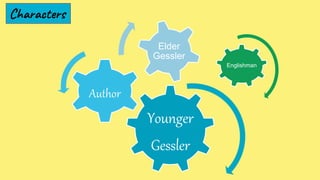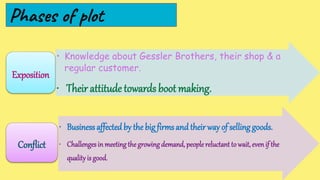NCERT: Grade 7 - Prose 5: Quality
- 1. QUALITY PROSE LESSON - 5 JOHN GLASWORTHY
- 2. JOHN GLASWORTHY(1867-1933)Author’s Corner Famous English Novelist & Playwright • John Galsworthy is a famous novelist and dramatist of 20th century. • He has won Nobel Prize for Literature in 1932. Won Nobel Prize in Literature in 1932 • Deals with social class, upper-middle class lives. Famous work: The Forsyte Saga • Highlights the characters’ insular, snobbish, attitude and their suffocating moral codes.
- 4. ● The author knew this shop from the days of his youth, because Gessler, the Boot Maker, made his father’s boots. ● Gessler lived with his elder brother. ● The shop was in a small by-street in a fashionable part of London. Gessler Brothers
- 5. • The shop had a certain quiet distinctions. There was no sign upon it other than the name GESSLER BROTHERS and in the window a few pairs of boots. ● Gesslers, German immigrants, genuinely passionate and dedicated Boot Makers, made boots only on orders. They are poor, belonging to lower stratum. ● What he made never failed to fit. Since his boots lasted terribly, the author was not possible to go that shop very often. Speciality of Gessler Brothers’ Shop
- 6. ● One day the narrator went to their shop to get a pair of Russian leather boots. He kept waiting, seated on the single wooden chair. ● Mr. Gessler came down the stairs, without coat, a little bent, in leather apron, with sleeves turned back. ● Getting the order, he again went upstairs and came after some time holding a fine gold brown leather piece, “beaudiful biece”, he said. ● After the narrator’s approval, he said “Tomorrow fordnighd”. Order for Russian Leather Boots
- 7. One day the narrator went to the boot shop and made a comment about that the last boots he got from Mr. Gessler creaked. Gessler couldn’t believe, “id shouldn’d’ave greaked”. Still wondering he asked, “You god dem wed”. But the author denied. After a long pause Mr. Gessler said, “Zen dem back, I’ll look at dem”, he also silently added “Zome boods are bad from birdt. Reaction to a complaint:
- 8. ● Once, the author absent-mindedly went into the Gessler Brothers shop wearing another boot bought in an emergency at a big firm. ● Gessler looked disturbed and took his orders without showing any leather. With his eyes penetrating on to the author’s shoes he said that, “Dose are nod my boods”. ● The anger-less, sorrow-less tone froze the author. With much bitter he said,”Dose big virms ‘ave no sself-respect, dey get id all by advertisement, nod by work, dey take it away who love our boods. Every year id gets less.” The true conflictHardship of Gessler’s trade
- 9. ● At the first place, the author hear him discuss the tough times of his profession. ● Even after the author gave explanation about the circumstances of those ill-omened boots, Mr. Gressler’s voice and face look depressed. ● Therefore the author ordered several pairs that lasted longer than ever. So, the author didn’t get a chance to meet Mr. Gesslers for the next 2 years. Author’s compassion
- 10. ● Many months later, when the author entered the shop, he thought that the elder Gessler was there and asked “How are you?” ● Gessler peered at him and replied, “I am breddy well, but my elder brudder is dead.” The author felt sorry. ● Gessler continued feebly, “he was a good man, he made good boods.” ● Then the author noticed that the younger Glessler had also grown week. Now showing a leather piece, Gessler enquired, “Do you wand any boods?” ● So, he ordered several pairs. It was delivered very late, but they were better than ever. Soon after he went abroad. Demise of Elder Gessler
- 11. ● After a year, soon after the author reached London, the first shop he went into was “Gessler Brothers”. ● When he met Mr. Gessler, he looked like 75, in fact much older than his age of 60 and he looked pinched and worn. ● Understanding that he was unable to truly recognise him, the author said, “I want boots of every kind.” ● When it reached him, he immediately tried them and posted the signed cheque at once. One last time at the shop
- 12. ● A week later, when the author passed by the little street, thought of telling Gessler how splendidly the new boots fitted him. ● In the shop, the name board was changed and an English man stood there and asked what the author needed. ● When the author enquired about Mr. Gessler, the English man said that he was dead. He also added that he starved to death. Demise of Gessler
- 13. ● When the narrator asked in curiosity, “ Starvation?”. ● Then the English man said, how poor Gessler made good quality boots over day and night, without giving time to take care of himself. Yet he was able to make only meagre quantity boots, he had money only to pay for rent and leather. ● He also certified him to be the only man in London who made good quality boots. The author agreed too. Resolution
- 16. Title- Quality In a highly competitivebusinessworld, Gessler brothers retainedperfection in their QUALITYwith the kindof raw materialstheyused Gessler brothers indeed exhibited good HUMAN QUALITY of supporting eachother, retaining customers for generations.
- 17. Theme - Quality Fight The life of traditional workers who fought a loosing battle against the industrial revolutionists of the 20th century.
- 18. Character Sketch • Secondmaincharacter,wealthy,boot lover,traveler,compassionate,values relationship. • Notto be seen, but portrayedas a good& skillfulman.Helpinghis brother. • Protagonist,Germanimmigrantin London,SkillfulBootmaker, committed, consistenthardworker.Yet, couldn’thandlethereality. • Secondarycharacter,who grabstheopportunityand alsosympathetic. The Englishman Younger Gessler Author Elder Gessler
- 19. INTERNAL (Mr. Gessler Vs Destiny) EXTERNAL (Gesslers’ shop Vs Big firms) CONFLICT
- 20. Phases of plot • Knowledge about Gessler Brothers, their shop & a regular customer. • Their attitude towards boot making. Exposition • Businessaffected by the bigfirmsand theirway of sellinggoods. • Challengesin meetingthegrowingdemand, peoplereluctant to wait,evenif the qualityis good. Conflict
- 21. • When the younger Gessler also dies. Dies his craftsmanship too. Climax • Gessler Brothers taken over by another Big firm. Resolution Phases of plot




















